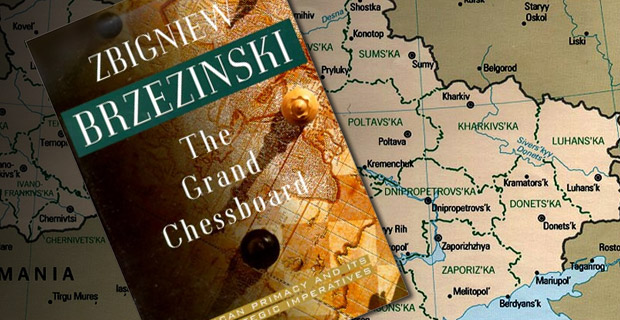March 16, 2014
“Ukraine, a new and important space on the Eurasian chessboard, is a geopolitical pivot because its very existence as an independent country helps to transform Russia. Without Ukraine, Russia ceases to be a Eurasian empire.” — Zbigniew Brzezinski
The Battle for Ukraine Was Planned in 1997 … Or Earlier
Neoconservatives planned regime change throughout the Middle East and North Africa 20 years ago. Robert Parry correctly points out that the Neocons have successfully “weathered the storm” of disdain after their Iraq war fiasco. But the truth is that Obama has long done his best to try to implement those Neocon plans.
Similarly, ever since the Soviet Union collapsed in 1991, the U.S. has pursued a strategy of encircling Russia, just as it has with other perceived enemies like China and Iran.
In 1997, Obama’s former foreign affairs adviser, and president Jimmy Carter’s national security adviser – Zbigniew Brzezinski – wrote a book called The Grand Chessboard arguing that the U.S. had to take control of Ukraine (as well as Azerbaijan, South Korea, Turkey and Iran) because they were “critically important geopolitical pivots”.
Regarding Ukraine, Brzezinski said (hat tip Chris Ernesto):
Ukraine, a new and important space on the Eurasian chessboard, is a geopolitical pivot because its very existence as an independent country helps to transform Russia. Without Ukraine, Russia ceases to be a Eurasian empire.
***
However, if Moscow regains control over Ukraine, with its 52 million people and major resources as well as access to the Black Sea, Russia automatically again regains the wherewithal to become a powerful imperial state, spanning Europe and Asia.
And now Obama is pushing us into a confrontation with Russia over Ukraine and the Crimea.
As Ernesto notes:
Late last year when Ukraine’s now-ousted president Viktor Yanukovych surprisingly canceled plans for Ukrainian integration into the European Union in favor of stronger ties with Russia, the US may have viewed Ukraine as slipping even further out of its reach.
At that point, with the pieces already in place, the US moved to support the ousting of Yanukovych, as evidenced by the leaked phone conversation between US Assistant Secretary of State Victoria Nuland [arch-Neocon Robert Kagan's wife] and US Ambassador to Ukraine Geoffrey Pyatt. When peaceful protests were not effective in unseating Yanukovych, the violence of the ultra-nationalist Svoboda party and Right Sector was embraced, if not supported by the west.
In today’s Ukraine, the US runs the risk of being affiliated with anti-Semitic neo-Nazis, a prospect it probably feels can be controlled via a friendly western media. But even if the risk is high, the US likely views it as necessary given the geopolitical importance of Ukraine, as Brzezinski mapped out in 1997.
In other words, Obama is following the same old playbook that the Neocons have been pushing for more than a decade. Washington’s Blog
One gets tired of reading about neocons, democrats, republicans and so on since there’s little difference between them.
.
Related:
Flashback: Putin’s Gambit – How the EU Lost Ukraine | mediachecker
[...]“But then there are the financial incentives. In the end, the Russian president seems to have promised his Ukrainian counterpart several billion [MC-> actually it was 15 billion] euros in the form of subsidies, debt forgiveness and duty-free imports. The EU, for its part, had offered Ukraine loans worth €610 million ($827 million), which it had increased at the last moment, along with the vague prospect of a €1 billion loan from the International Monetary Fund (IMF). Yanukovych chose Putin’s billions instead.
The EU had been banking on its radiant appeal, and on its great promise of prosperity, freedom and democracy, but now Brussels must confront the fact that, for the first time, an attempt at rapprochement was rebuffed because the price was wrong. “If Yanukovych doesn’t want to make a deal, then he simply doesn’t want to,” says Brok.
Battle of the Unions
The EU’s eastern partnership had gotten off to a rocky start even before the Ukrainian incident. Belarus dashed the EU’s hopes it would join when protesters were violently suppressed after the reelection of President Alexander Lukashenko in 2010. Armenia called off an association agreement with the EU this September.
In the case of Ukraine, it initially seemed as if the Europeans’ rational arguments would prevail over Russia’s threatening gestures. According to an internal EU analysis, joining the “Eurasian Union” — a Russia-backed proposed political and economic union including Russia, Tajikistan, Kazahkstan, Belarus and others — would severely limit Ukraine’s sovereignty. Once such a union had been formed, Kiev would no longer be able to enter into any other free trade agreements without Moscow’s approval. An alliance with Moscow would thus have the exclusive nature of a marriage. The EU’s eastern partnership, in contrast, would still allow Ukraine to enter into other alliances.
And Yanukovych, who has been considered a puppet of the Kremlin, even implemented many of the reforms demanded by the EU. The legal system and criminal law were modernized, trade restrictions were reduced and a few political prisoners were released. “He implemented more reforms than the pro-Western predecessor regime under Tymoshenko,” says an EU negotiator.
EU hopes were dashed[...] continued - a good history of recent events.

